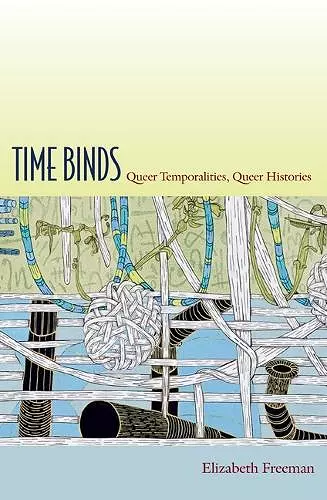Time Binds
Queer Temporalities, Queer Histories
Format:Hardback
Publisher:Duke University Press
Published:29th Nov '10
Currently unavailable, and unfortunately no date known when it will be back

A work of queer theory focusing on the relationship between pleasure and time
By foregrounding bodily pleasure in the experience of time and its representation in queer literature, film, video, and art, Elizabeth Freeman challenges queer theorys recent emphasis on loss and trauma.Time Binds is a powerful argument that temporal and sexual dissonance are intertwined, and that the writing of history can be both embodied and erotic. Challenging queer theory’s recent emphasis on loss and trauma, Elizabeth Freeman foregrounds bodily pleasure in the experience and representation of time as she interprets an eclectic archive of queer literature, film, video, and art. She examines work by visual artists who emerged in a commodified, “postfeminist,” and “postgay” world. Yet they do not fully accept the dissipation of political and critical power implied by the idea that various political and social battles have been won and are now consigned to the past. By privileging temporal gaps and narrative detours in their work, these artists suggest ways of putting the past into meaningful, transformative relation with the present. Such “queer asynchronies” provide opportunities for rethinking historical consciousness in erotic terms, thereby countering the methods of traditional and Marxist historiography. Central to Freeman’s argument are the concepts of chrononormativity, the use of time to organize individual human bodies toward maximum productivity; temporal drag, the visceral pull of the past on the supposedly revolutionary present; and erotohistoriography, the conscious use of the body as a channel for and means of understanding the past. Time Binds emphasizes the critique of temporality and history as crucial to queer politics.
“Time Binds is an elegant book bristling with intelligence and wit. A fascinating blend of the familiar and the new, it will have a major hand in opening up queer theory, to its own repressed, to its own dreams, to take its chances.”—Carolyn Dinshaw, author of Getting Medieval: Sexualities and Communities, Pre- and Postmodern
“Blazing and brilliant. Elizabeth Freeman forges claims with texture, rigor, relevance, and grace, giving her masterful, original study a voice of unusual tenderness and depth. Clearly, Freeman stands at the forefront of where queer theory needs to go: into the strangeness, the utter queerness, lying inside the beats of time.”—Kathryn Bond Stockton, author of The Queer Child, or Growing Sideways in the Twentieth Century
“Despite the queer academy’s distance from corporeality and the promotion of more transcendental approaches to historiography, Freeman boldly outlines history as an erotic, embodied experience. . . . Without cleansing their hands of the complicatedness of history’s racial legacies, these theorists explore the messiness of queerness. Freeman’s book is centered on queer time and queer history’s exciting and, at times, (corporeally) violent moments. . . . Fierce indeed.” -- Lizzy Shramko * Lambda Book Report *
“Positive but not celebratory, exploratory but rigorous, grounded in the messy referentiality of bodies and texts but compellingly speculative, Time Binds is a pathbreaking book that will have multifarious impacts upon queer and feminist studies.”
-- Guy Davidson * Australian Feminist Studies *
“In addition to elegant and radical close readings, Time Binds gives us a way to think about pleasure and temporality in combination. . . . Time Binds provides us with close readings of experimental works of film and literature while simultaneously exposing the political stakes of temporality by foregrounding pleasure and the body on both an individual and collective level.” -- Amber Jamilla Musser * Reviews in Cultural Theory *
“In the end, Freeman offers us a queer future in which close reading remains both a practice and a pleasure we might repurpose for our own sexual–textual encounters, as well as a method of doing queer history through which we are able to feel in touch with, and touch, the social. For making pining for pleasurable encounters with the past, lingering over texts and bodies, and ‘lesbian’ sex hot again in a ‘new now’ kind of way, Freeman’s book rightly demands we take pause via the sensory, and the sensual, to feel the queerness in this.” -- Gino Conti * Textual Practice *
"Time Binds is perhaps the most compelling argument for the ways non-normative relationships with time and history can be particularly generative for queer politics." -- Craig Jennex * TOPIA *
ISBN: 9780822347903
Dimensions: unknown
Weight: 481g
256 pages